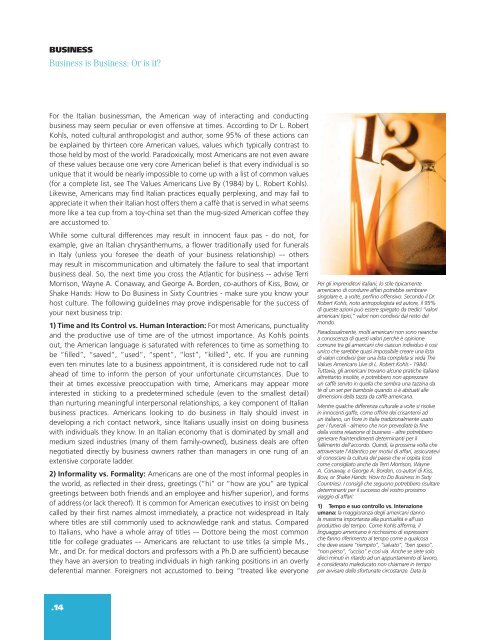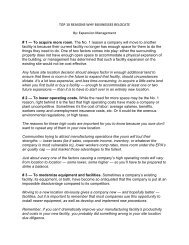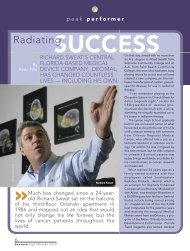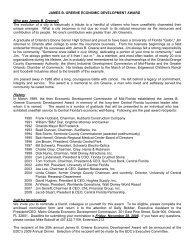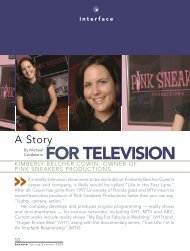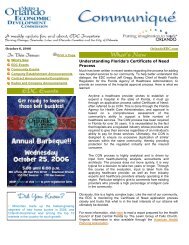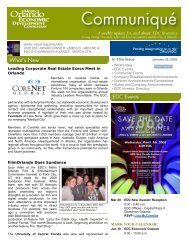orlando interview itculture business is business: or is it?
orlando interview itculture business is business: or is it?
orlando interview itculture business is business: or is it?
- No tags were found...
You also want an ePaper? Increase the reach of your titles
YUMPU automatically turns print PDFs into web optimized ePapers that Google loves.
BUSINESSBusiness <strong>is</strong> Business: Or <strong>is</strong> <strong>it</strong>?F<strong>or</strong> the Italian <strong>business</strong>man, the American way of interacting and conducting<strong>business</strong> may seem peculiar <strong>or</strong> even offensive at times. Acc<strong>or</strong>ding to Dr L. RobertKohls, noted cultural anthropolog<strong>is</strong>t and auth<strong>or</strong>, some 95% of these actions canbe explained by thirteen c<strong>or</strong>e American values, values which typically contrast tothose held by most of the w<strong>or</strong>ld. Paradoxically, most Americans are not even awareof these values because one very c<strong>or</strong>e American belief <strong>is</strong> that every individual <strong>is</strong> sounique that <strong>it</strong> would be nearly impossible to come up w<strong>it</strong>h a l<strong>is</strong>t of common values(f<strong>or</strong> a complete l<strong>is</strong>t, see The Values Americans Live By (1984) by L. Robert Kohls).Likew<strong>is</strong>e, Americans may find Italian practices equally perplexing, and may fail toappreciate <strong>it</strong> when their Italian host offers them a caffè that <strong>is</strong> served in what seemsm<strong>or</strong>e like a tea cup from a toy-china set than the mug-sized American coffee theyare accustomed to.While some cultural differences may result in innocent faux pas - do not, f<strong>or</strong>example, give an Italian chrysanthemums, a flower trad<strong>it</strong>ionally used f<strong>or</strong> funeralsin Italy (unless you f<strong>or</strong>esee the death of your <strong>business</strong> relationship) –- othersmay result in m<strong>is</strong>communication and ultimately the failure to seal that imp<strong>or</strong>tant<strong>business</strong> deal. So, the next time you cross the Atlantic f<strong>or</strong> <strong>business</strong> -- adv<strong>is</strong>e TerriM<strong>or</strong>r<strong>is</strong>on, Wayne A. Conaway, and Ge<strong>or</strong>ge A. B<strong>or</strong>den, co-auth<strong>or</strong>s of K<strong>is</strong>s, Bow, <strong>or</strong>Shake Hands: How to Do Business in Sixty Countries - make sure you know yourhost culture. The following guidelines may prove ind<strong>is</strong>pensable f<strong>or</strong> the success ofyour next <strong>business</strong> trip:1) Time and Its Control vs. Human Interaction: F<strong>or</strong> most Americans, punctual<strong>it</strong>yand the productive use of time are of the utmost imp<strong>or</strong>tance. As Kohls pointsout, the American language <strong>is</strong> saturated w<strong>it</strong>h references to time as something tobe “filled”, “saved”, “used”, “spent”, “lost”, “killed”, etc. If you are runningeven ten minutes late to a <strong>business</strong> appointment, <strong>it</strong> <strong>is</strong> considered rude not to callahead of time to inf<strong>or</strong>m the person of your unf<strong>or</strong>tunate circumstances. Due totheir at times excessive preoccupation w<strong>it</strong>h time, Americans may appear m<strong>or</strong>einterested in sticking to a predetermined schedule (even to the smallest detail)than nurturing meaningful interpersonal relationships, a key component of Italian<strong>business</strong> practices. Americans looking to do <strong>business</strong> in Italy should invest indeveloping a rich contact netw<strong>or</strong>k, since Italians usually ins<strong>is</strong>t on doing <strong>business</strong>w<strong>it</strong>h individuals they know. In an Italian economy that <strong>is</strong> dominated by small andmedium sized industries (many of them family-owned), <strong>business</strong> deals are oftennegotiated directly by <strong>business</strong> owners rather than managers in one rung of anextensive c<strong>or</strong>p<strong>or</strong>ate ladder.2) Inf<strong>or</strong>mal<strong>it</strong>y vs. F<strong>or</strong>mal<strong>it</strong>y: Americans are one of the most inf<strong>or</strong>mal peoples inthe w<strong>or</strong>ld, as reflected in their dress, greetings (“hi” <strong>or</strong> “how are you” are typicalgreetings between both friends and an employee and h<strong>is</strong>/her superi<strong>or</strong>), and f<strong>or</strong>msof address (<strong>or</strong> lack thereof). It <strong>is</strong> common f<strong>or</strong> American executives to ins<strong>is</strong>t on beingcalled by their first names almost immediately, a practice not widespread in Italywhere t<strong>it</strong>les are still commonly used to acknowledge rank and status. Comparedto Italians, who have a whole array of t<strong>it</strong>les –- Dott<strong>or</strong>e being the most commont<strong>it</strong>le f<strong>or</strong> college graduates –- Americans are reluctant to use t<strong>it</strong>les (a simple Ms.,Mr., and Dr. f<strong>or</strong> medical doct<strong>or</strong>s and profess<strong>or</strong>s w<strong>it</strong>h a Ph.D are sufficient) becausethey have an aversion to treating individuals in high ranking pos<strong>it</strong>ions in an overlydeferential manner. F<strong>or</strong>eigners not accustomed to being “treated like everyonePer gli imprend<strong>it</strong><strong>or</strong>i <strong>it</strong>aliani, lo stile tipicamenteamericano di condurre affari potrebbe sembraresingolare e, a volte, perfino offensivo. Secondo il Dr.Robert Kohls, noto antropolog<strong>is</strong>ta ed aut<strong>or</strong>e, il 95%di queste azioni può essere spiegato da tredici “val<strong>or</strong>iamericani tipici,” val<strong>or</strong>i non condiv<strong>is</strong>i dal resto delmondo.Paradossalmente, molti americani non sono neanchea conoscenza di questi val<strong>or</strong>i perchè è opinionecomune tra gli americani che ciascun individuo è cosìunico che sarebbe quasi impossibile creare una l<strong>is</strong>tadi val<strong>or</strong>i condiv<strong>is</strong>i (per una l<strong>is</strong>ta completa si veda TheValues Americans Live di L. Robert Kohls - 1984).Tuttavia, gli americani trovano alcune pratiche <strong>it</strong>alianealtrettanto insol<strong>it</strong>e, e potrebbero non apprezzareun caffè serv<strong>it</strong>o in quella che sembra una tazzina datè di un set per bambole quando si è ab<strong>it</strong>uati alledimensioni della tazza da caffè americana.Mentre qualche differenza culturale a volte si r<strong>is</strong>olvein innocenti gaffe, come offrire dei cr<strong>is</strong>antemi adun <strong>it</strong>aliano, un fi<strong>or</strong>e in Italia tradizionalmente usatoper i funerali - almeno che non prevediate la finedella vostra relazione di <strong>business</strong> - altre potrebberogenerare fraintendimenti determinanti per ilfallimento dell’acc<strong>or</strong>do. Quindi, la prossima volta cheattraversate l’Atlantico per motivi di affari, assicuratevidi conoscere la cultura del paese che vi osp<strong>it</strong>a (cosìcome consigliato anche da Terri M<strong>or</strong>r<strong>is</strong>on, WayneA. Conaway, e Ge<strong>or</strong>ge A. B<strong>or</strong>den, co-aut<strong>or</strong>i di K<strong>is</strong>s,Bow, <strong>or</strong> Shake Hands: How to Do Business in SixtyCountries). I consigli che seguono potrebbero r<strong>is</strong>ultaredeterminanti per il successo del vostro prossimoviaggio di affari:1) Tempo e suo controllo vs. Interazioneumana: la maggi<strong>or</strong>anza degli americani dannola massima imp<strong>or</strong>tanza alla puntual<strong>it</strong>à e all’usoproduttivo del tempo. Come Kohls afferma, illinguaggio americano è ricch<strong>is</strong>simo di espressioniche fanno riferimento al tempo come a qualcosache deve essere “riemp<strong>it</strong>o”, “salvato”, “ben speso”,“non perso”, “ucc<strong>is</strong>o” e così via. Anche se siete solodieci minuti in r<strong>it</strong>ardo ad un appuntamento di lav<strong>or</strong>o,è considerato maleducato non chiamare in tempoper avv<strong>is</strong>are delle sf<strong>or</strong>tunate circostanze. Data la.14


